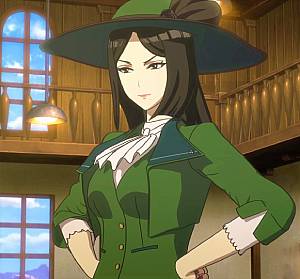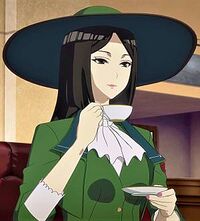Julia binti Darma
Julia binti Darma | |
|---|---|
 Julia, circa 1935 | |
| Prime Minister of Melayu | |
| In office 1 March 1930 – 1 March 1960 | |
| Personal details | |
| Born | 20 January 1900 Sanglang, Lucian Melayu |
| Died | 29 February 1988 (aged 88) Ranau, Melayu |
| Political party | Green Movement |
| Nickname | Comrade Julia |
Julia binti Darma (20 January 1900 – 29 February 1988), also known as Comrade Julia (Melay: Komrad Julia), was a Melay revolutionary and politician who served as Prime Minister of Melayu from 1930 to 1960. Under her administration, Melayu became a socialist state and underwent sweeping progressive reforms known as the "Green Revolution". Her theories and political policies are collectively known as Julianism.
Julia was the daughter of Darma bin Luncai, a famed military leader who fought in the Melay war of independence and subsequent civil war on behalf of the Melay National Front. Given political responsibility while her father was at the front, she gathered a power base and staged an internal coup in 1930. Having taken power, she marginalised and purged the old guard, turned the Melay National Front into the Green Movement, and proclaimed Melay independence, which was recognised by the 1931 Statute of Herrenhausen.
Julia turned Melayu into a socialist state, with the Green Movement as the dominant party and a strict ban on capitalism. She pursued an eclectic model of socialism, based on social ownership, cooperatives as the basis of the economy, and decentralised planning. Life expectancy and literacy greatly increased as a result of expanded public education and healthcare. She introduced extensive social liberalising reforms, which included state secularism, women's rights, LGBT rights, drug liberalisation, and legalisation of sex work.
Abroad, Julia supported anti-imperialist and communist revolutionary groups, leading to periods of Melay isolation. She concluded an alliance with the Empire of Quenmin during the Second Europan War out of necessity, allowing Melayu to remain neutral during the conflict and avoid occupation. She was fiercely opposed to the post-war authoritarian socialist regimes of Lorica and Nanja Republic, challenging them for moral supremacy of the global left.
She retired as Prime Minister in 1960 and left politics, but continued to influence public opinion through writing and speeches until her death on 29 February 1988. The longest-serving elected head of government, she left a great impact on Melayu and influenced different individuals and groups across the world. She is commemorated in Melayu through an ongoing cult of personality.
Early life
Julia was born on 20 January 1900 in Sanglang. She was the daughter of Darma bin Luncai — who had served in the United Kingdom army and fought in the First Europan War, achieving the rank of lieutenant — and Kartika binti Suria. She had two older brothers, with whom she was very close throughout her life.
She initially attended school in her hometown. In 1918, she moved to Gallia-Bruhl to attend university, studying art. She remained there for the next decade, which kept her safe as the Melay war of independence erupted in 1920. Julia fell in love with Gallia-Bruhl, throwing herself into its café society and spending most of her time in bohemian circles. This gave her a lifelong sympathy for bohemianism and shaped her politics.
Through the artistic circles of Gallia-Bruhl, Julia was introduced to leftist theory, and became an avid reader of Karl Marx, Rosa Luxemburg, and other leftist theorists. She was strongly influenced by Marxist humanism, and came to reject the Blanquist model of revolution.
Rise to power
While Julia lived in Gallia-Bruhl, the Melay war of independence became a civil war, with her family joining the Melay National Front. Unaware of her growing political beliefs, her father asked her to return to Melayu in 1928 and join the Melay National Front, which she did.
Julia stayed behind and took on political responsibilities while her father was at the front. She quickly set about turning the amorphous Melay National Front into a "political instrument" for organising the Melay state. Within 2 years, she was able to build a power base behind her.
Confronted by the suspicion and resistance of the "old guard", she concluded that "the people necessary to win the revolution are the least capable of winning the peace". The war ended on 28 February 1930, and Julia subsequently staged an internal coup. She took the reins of the Melay National Front and marginalised and purged the old guard, including her father.
Prime Minister of Melayu
Consolidating power
Julia proclaimed the independence of Melayu on 1 March 1930, and had herself sworn in as Prime Minister. She reorganised the Melay National Front into the Green Movement and introduced a provisional constitution, which proclaimed Melayu a federal socialist state and banned all capitalist and right-wing parties. A new flag, coat of arms, national motto, and national anthem were adopted.
Aged only 30 on taking office, Julia was the youngest Prime Minister of Melayu, and one of the world's youngest heads of government. Having lived in Gallia-Bruhl for so long, she was an unknown quality during her rapid rise to power, but enjoyed significant popularity due to her charisma and glamorous image.
She took advantage of new media platforms, establishing the national public broadcaster and delivering a series of radio addresses to create a "dialogue with the people". She created a media department at the Prime Minister's Office, and made regular visits throughout the country, yielding impactful newsreel footage.
The Green Movement quickly filled the vacuum left by the civil war and the destruction of the right-wing. While Julia maintained a multiparty system, it was now exclusively restricted to left-wing politics, as advocacy of capitalism was banned and punishable by prison. This left few left-wing rivals, including the Communist Party, Solidarity Party, and People's Party, whose leaders proved no match for her charisma and political talent.
The 1931 Statute of Herrenhausen recognised Melayu's independence. Julia trumpeted this as a confirmation of Melay independence, while the Lucian government considered it the formal date of Melay independence, ignoring the previous declaration of 1 March 1930. Nevertheless, it was a triumph for Julia, as Melayu had completely severed ties with the Lucis Empire, and since the provisional constitution had made it a republic, it was ineligible for membership of the Commonwealth.
Melayu achieved independence without its full territory, as the Fall of Singapura left Singapura part of the Empire of Quenmin, a situation which lasted until the Second Europan War. During her initial tenure, Julia preferred to ignore the issue of Singapura for pragmatic reasons: Melayu had just endured civil war and was in no position to fight a conflict with Quenmin over a small island.
The first elections for the new Parliament of Melayu took place in 1932, and saw the Green Movement win a landslide victory. It obtained a supermajority in the legislature, which it would retain throughout Julia's term.
Green Revolution
Julia pursued an eclectic socialist path, with the fundamental tenets being social ownership, cooperatives, workers' self-management, and decentralised planning. She fiercely guarded Melay independence and was suspicious of ties to capitalist nations, worrying that this risked subverting the revolution. In her first terms, she took a autarkic approach, isolating Melayu from international markets and relying on mobilising internal resources for reconstruction.
Economic reforms

A land reform redistributed arable land to agricultural cooperatives, and factories turned over to workers' councils organised in the Melay Trades Union Congress. Education and health care were nationalised and greatly expanded. Infrastructure improvements took precedence, as communications were vital to the success of decentralised planning. The government spent enormous sums on public works, including roads, railroads, telegraph and telephone lines, water, sanitation, public housing, and other amenities. The universal basic ration (Catuan Asas Sejagat) was introduced to provide food and prevent food shortages or hunger.
While these reforms improved Melayu's standard of living, the country was devastated from years of war and required significant reconstruction. Julia abhorred the idea of a command economy, and her strategy of upholding decentralised planning at all costs created a sluggish and slow recovery until infrastructure improved and planners worked out best practices through trial and error.
At independence, agriculture was the largest sector of the Melay economy. Accordingly, Julia dedicated much attention to agricultural policy, and remarked: "For the Green Revolution to succeed, we must get our agriculture right before anything else." Her approach to agricultural policy reflected her diverse political influences and her opposition to centralisation.
Her agrarian policies included land redistribution that broke up large estates, encouragement of agricultural cooperatives, providing affordable credit for farmers, and disseminating new methods of cultivation and machinery. Notably, they encouraged smallholding and small-scale production, with the aim of providing each farmer with their own small farm, enough to work by themselves. The state collected a food tax (cukai makanan), paid in kind. The food tax was set to the equivalent of the universal basic ration, with all surplus produce left at the disposal of farmers.
Julia believed farmers' cooperation was vital to the success of her program, and she made great efforts to secure the support of farmers and the Agrarian Union. She said in one speech: "We must make sure our farmers have their belly full, and their spirit hale and hearty, before we can even begin thinking about transforming Melayu." She used her influence on both sides of the coin, providing farmers with an appealing vision of themselves as "good-natured, sober, mildly old-fashioned, and at peace with their life" that ensured they wouldn't resist the Green Revolution, and simultaneously appealed to workers and radicals to occasionally restrain their goals or methods to not provoke backlash.
One of Julia's famous eccentricities was a love of airships, which she saw as a more comfortable and humane form of air travel than airplanes, even if they were much slower. She put airship infrastructure ahead of airplane infrastructure, building more mooring masts and airship hangars across Melayu than airports. She was greatly fascinated by the pomp of air travel, and took advantage of it to bolster her public image.
The Second Europan War helped stimulate Melayu's industrialisation. With education, health care, and infrastructure all improving, Julia gradually eased the autarkic policies and cautiously opened Melayu for foreign trade. However, she maintained protectionist policies that included capital controls, foreign exchange controls, and non-tarriff barriers to trade.
Economic growth rose to a rate of around 4–5% in the 1940s and 1950s, still hampered by the non-convertible currency and strict wage ceiling of Ᵽ1 million for liquid wealth. Most of the economy was now dominated by cooperatives, the economic arm of the Melay Trades Union Congress, and state-owned enterprises.
Social reforms
Julia introduced still more radical social reforms to complement her economic ones. She proclaimed a secular state and launched an anti-religious drive. Religious schools were shut down, and people with religious surnames were pressured to change their names. She introduced a long-term policy of transforming and harnessing religion for socialist purposes, both creating new rituals to supplant established ones and encouraging atheist activism.
The Abrahamic religions bore the brunt of Julia's anti-religious policies, as she hated monotheism. By contrast, Melay schools emphasised the animist and polytheist heritage of the ancient Melay, and Buddhism and Hinduism received official toleration, with Buddhist festivals being recognised as public holidays, while churches and mosques were shut down. The policy led to the suppression of Abrahamic religions in Melayu, which at times caused rebellions that were crushed by the government.
As one of the few female heads of government at the time, Julia championed the cause of women's rights and feminism. She passed extensive reforms to ensure equality for women, including a gender-neutral civil code, gender quotas to ensure women represented at least half of legislatures at all levels, new laws on divorce and civil unions, campaigns for women to attend universities and obtain professional degrees, and a sweeping anti-discrimination law.
She took a similar approach to LGBT rights, abolishing any laws against homosexuality, making marriage gender-neutral, and encouraging a sexual revolution that would abolish the old gender binary and achieve sexual emancipation. An official Institute for Sexual Research was established in 1934, making Melayu a centre of sexual research in Asianna.
At a time when world policy tended towards prohibition of drugs, Julia took a radical turn in the opposite direction by adopting drug liberalisation. The manufacture and distribution of tobacco, alcohol, and drugs was made a government monopoly. Melayu became a significant hub of drug production and distribution, and has sometimes been labeled a narco-state due to its rejection and flouting of foreign anti-drug policies.
Julia supported the right to keep and bear arms from a left-wing perspective, citing Karl Marx's quote, "Under no pretext should arms and ammunition be surrendered; any attempt to disarm the workers must be frustrated, by force if necessary." Her government implemented liberal laws on firearms acquisition, paired with strict regulation on storing and transportation of guns and ammunition. She abhorred militarisation, and favoured developing a "socialist citizens' militia", which the firearms regulation encouraged.
Cultural reforms
Julia created the National Cultural Policy (Dasar Budaya Negara) to promote Melay culture and subsidise the arts. Creating artistic and cultural venues was a major component of her government's public works programs. Arts education became widely accessible, and subsidies were granted to cities and villages to organise artistic festivals and performances.
Julia abhorred the philistinism of authoritarian socialism, and frequently proclaimed in her speeches, "We're not just trying to make life better for Melay, we're trying to make life happier!". She rejected the idea of transforming society by reducing all to the status of the working class — instead, her preferences leaned more towards raising all to the status of petite bourgeoisie. The strict wage ceiling and high progressive tax rates ensured that individual business activity was monopolised by artisans, handicrafts, and small-scale merchants.
While her rationing policies strongly promoted an ethos of frugality in Melay society, this did not automatically mean simple living. Julia was strongly interested in fashion as a rebuke to the capitalist view that socialism meant poverty. She established a state clothing company, PKM, to provide clothing to Melay at affordable prices.
Besides the personal example she set, she launched a long-running national campaign to encourage the Melay public to maintain good standards of appearance, and to embrace fashionable and beautiful clothes. Notably, this campaign put emphasis on developing individual sense of style, attacking the notion of cyclical fashion as wasteful, and encouraged cross-dressing. One of her best-known quotes on the subject was: "Dressing well in public is a sign of our respect for ourselves as well as others. It doesn't matter your background or your station in life. If we are all well-dressed in public, it means we've made a kinder and gentler society, where appearance doesn't matter as much as personal character."
The campaign was especially effective and continues to influence Melay fashion and appearance standards to this day.
Foreign policy

Foreign policy proved a daunting challenge throughout Julia's term in office. Melayu officially being a socialist state engendered suspicion and periods of tension, while her instinct was to reduce contact or trade with capitalist nations to the minimum level necessary. She was opposed to foreign aid, saying that "Whoever feeds you, controls you", and defaulted on Melayu's debts on independence.
The Empire of Quenmin proved to be the immediate threat. Julia knew that the war-devastated Melayu stood no chance in a conflict, and thus took a pragmatic tack of seeking alliance with Quenmin. She sought to convince the Quenminese government she would not oppose their ambitions in Southeastern Asianna.
She managed to secure an alliance with Quenmin, and Melayu remained neutral when the Second Europan War broke out. When the Quenminese government once pressured the Melay government to join the war effort, Julia made demands she knew the Quenminese government could not meet, in order to stay out of the war. She made it clear that Melayu would not allow Quenmin to use its territory for a proposed invasion of Zanarkand.
Under the cover of neutrality, Julia provided support to both the Allies and Federation. When the tide of war turned against Quenmin, she broke off the alliance and declared war just as Quenmin was about to be invaded. Although Melayu had no participation in Operation Arbiter and Operation Inevitable, it was still counted as part of the Allies at the war's end, much to the annoyance of Allied leaders rankled by Julia's opportunism.
Following the Second Europan War, Julia supported anti-imperialist and communist revolutionary groups. She was fiercely opposed to the post-war authoritarian socialist regimes of Lorica and Nanja Republic, challenging them for moral supremacy of the global left. Melay diplomacy entered a period of convulsion: Julia's support of communist revolutionaries would lead to isolation, leading her to de-emphasise this aspect to improve relations with other nations, until she renewed vocal support in order to protect her left-wing credentials.
Ethnic relations
At independence, Melayu inherited a sizeable minority of Europan residents from Lucian colonisation. Julia concerned herself with protecting the Europan community and preventing an exodus. She firmly rebuked Melay radicals who expected that independence would be an opportunity for revenge against the formerly dominant minority.
In her public speeches, Julia called for "a Melayu without hatred or bitterness", and urged the Melay to accept their non-Melay fellow citizens as neighbours. She carried out several war crimes tribunals to punish crimes committed against Europeans during the civil war. When her father expressed skepticism at her effort to assuage Europans in a cabinet meeting, she replied, "If we in Melayu can't even look after our own, what hope do we have?".
Julia succeeded in reassuring the Europan community and preventing an exodus. Only around 10.000 Europans left Melayu during her tenure. Her economic reforms drastically reduced inequality and wealth concentration, eliminating another potential cause of ethnic tensions.
Many observers remarked on how Julia's strong dislike of the United Kingdom in foreign politics turned to an equally vehement protective attitude towards Europans in Melay on the domestic front. The Lucian Melay, who feared the worst at the war, were astonished by her transformation into a champion of ethnic reconciliation. Lucian voters became staunch and reliable supporters of the Green Movement.
Results
The Green Revolution touched on every aspect of Melay life and took permanent root in the country. One historian wrote: "To say that Julia remade Melayu in her image is certainly an understatement."
Julia's term in office saw the reconstruction and modernisation of Melayu. Her resistance to centralised planning caused Melayu to have a slow but steady recovery from the civil war, and economic growth rates rarely surpassed the 4–5% range. Although Melayu fell behind other nations experiencing economic booms, it was able to create a well-to-do egalitarian society, with the majority of Melay living comfortable lives, mostly achieving her ambition to raise the population to the material level of petit bourgeoisie.
Life in Melayu came to be defined by the "fascinating paradox" of modernisation and moderation — private frugality combined with lavish infrastructure, social liberalisation that preserved vintage ideals of elegance, an egalitarian society with an emphasis on self-reliance, and the emergence of a socialist gun culture.
Julia's rapid ascent to power and creation of the Green Movement made her the standard-bearer of socialism for the Melay public. The Melay socialist movement essentially became subordinated to her; the Melay left was unable to produce a public figure to match Julia's stature or attractive vision. Socialism in Melayu was absorbed by Julianism and its comparatively eccentric preferences, particularly on social issues and aesthetics.
Retirement
After leading the Green Movement to victory in 7 elections, Julia announced she would step down ahead of the 1960 federal election, and would not name a successor, leaving that up to the party. She left office on 1 March 1960, completing a 30-year tenure that made her the longest-serving elected head of government in Asianna.
Later life and death
Although Julia retired from national politics, she continued to write and deliver speeches to influence public opinion.
Her health started to falter in the late 1970s, and she underwent medical treatment and surgery on a few occasions.
She died on 29 February 1988 at home, aged 88, of natural causes. She was granted a state funeral.
Ideology
Julia's ideological worldview was molded by her environment, specifically her military leader father, exposure to café society in Gallia-Bruhl, and interest in leftist theory. She proclaimed herself to be a socialist, but despised ideological rigidity and favoured experimentation. The result was a unique variety of socialism that was named "Julianism" (Julianisme).
According to one of her brothers, Julia "despised anything 'big' — big business, big government, big buildings — and sympathised with the 'small' naturally." She was opposed to centralisation and models of authoritarian socialism, which led her to embrace federalism and cooperatives as a superior model. She sought to put the means of production in common ownership mainly through transferring them to workers' councils and cooperatives, leaving only the commanding heights of the economy in public ownership.
Julia was also a nationalist and a populist. She was particularly adept at using left-wing nationalist and left-wing populist themes in her speeches, presenting herself as a symbol of the people rising up against the elites. Her nationalism informed her desire for complete Melay independence, leading to her suspicion of foreign trade and occasional pushes for self-sufficiency.
Much of her nationalist sentiment was channeled against the United Kingdom, which she saw as a colonialist oppressor. She deliberately promoted 1 March 1930 as the date of Melay independence, to emphasise that Melayu had won its independence by itself and the 1931 Statute of Herrenhausen had simply recognised it. Initially, she felt no need to maintain relations with the United Kingdom; the first embassy was only established in 1947. Relations remained cool for the rest of her tenure, and only began to improve under her successors.
Julia emphasised social liberalism, progressivism, and secularism as fundamental elements of a modern society, and pushed Melayu towards that goal. She was personally an atheist, but felt that simple anti-religious campaigns would not be effective, and thus studied instead ways of reforming belief systems such as the Cult of Reason and Cult of the Supreme Being. She hated monotheism because she considered it a totalitarian and backward force, and favoured polytheism and animism because she thought they were more conducive to a democratic society. She had a high opinion of Buddhism, praising it as "a philosophy with some rituals attached" rather than a religion.
Personal life
Julia possessed several traits that made her a dominant figure in Melay politics. She was very charming and extroverted, enjoying the company of others, and had a particular affection for children. She had a mischievous sense of humour, which she used to relax others, and was often the first to make jokes about herself in conversation. At the same time, she was proud and headstrong; observers disagreed on whether she was "extremely self-confident" or outright "arrogant".
She was an avid reader with a good memory for details. Some of her close friends were surprised that apart from leftist theory, she preferred to read "trashy books", which seemed at odds with her cultured manner. She was keenly interested in the arts and admired artistic talent and bohemianism. She frequently attended concerts, cinemas, museums, and art galleries.
Julia was fluent in English and French besides her native Melay, and spoke English with a pronounced Lucian accent. Before official visits, she made efforts to learn phrases in the hosts' language as a courtesy; her Quenminese was reportedly so bad that Quenminese officials pleaded with her to never attempt Quenminese again.
At odds with her public attacks on the United Kingdom, she was a Luciaphile in private. She expressed fondness for Lucians' "good manners, pleasant character, and tolerance", and had tea daily. Her preferred milk tea became a popular recipe nicknamed "Julia's special" (Istimewa Julia). While she was identified with hedonism due to her drug liberalisation policies, she did not drink, smoke, or take drugs.
She lived a frugal lifestyle. As Prime Minister, she lowered her salary to the average worker's wage, made the cheapest car sold in Melayu at the time the official service car, and limited her possessions to a bike, writing implements, and a refrigerator. In her official residence, her office consisted solely of a bookshelf, a writing desk, and a telephone and radiofax.
Marriage and family
Julia married Patrick Descombes (1900–1989) in 1927. The marriage lasted until her death, with no children. The two were devoted to each other and had a happy marriage. Acquaintances often remarked that Patrick, a "bohemian dandy with a strong interest in the arts", was a "perfect" match for Julia. Patrick often encouraged Julia's self-confidence, admitting that he was especially attracted to her "delightful arrogance", but also reminded her regularly that "Julia binti Darma is big enough to admit when she's wrong".
Patrick was Julia's closest confidante, and much as she championed women's rights, he defied stereotypical notions of masculinity. He typically held her arm when they were in public together and often gazed at her in awe. Julia praised Patrick as "the best househusband a lady could hope for", and would good-naturedly joke before public events, "Now, darling, don't forget to stand still and look pretty!".
Julia was very close to her family, particularly her brothers. Her father was initially hurt by the way she pushed him out of the Green Movement; one of her first actions after taking power was to invite him to her office to reconcile. She told Darma that she bore no personal animosity and simply thought she would make a better leader than him. This repaired their relationship, and she then appointed him defense minister in her government.
Public image

Julia possessed a unique figure both in Melay politics and among leftist revolutionaries. She was mocked by opponents as a champagne socialist due to the perceived tension between her socialist beliefs and public image. Far from being insulted, she seized on the epithet to highlight her difference from authoritarian socialists, boasting that the Green Revolution had made life in Melayu "more cheerful and pleasant" than places like Lorica or Nanja.
Julia sought to present herself as a "woman of the people", although she acknowledged her background and time in Gallia-Bruhl without embarrassment. She was known simply as "Comrade Julia" (Komrad Julia), and refused to accept any other titles. Similarly, she eschewed grandiose titles in office, opting for the relatively conventional "Prime Minister".
Julia relied heavily on charismatic authority to exercise power and mobilise support. She was prolific in her visits across the country, and attracted large crowds to her speeches. She also regularly addressed the nation on radio and television, contributing to a high level of intimacy with politics and allowing the public to see her as a friendly, maternal figure. In her speeches, she avoided dramatic oratory and strove to use common words and analogies.
Further setting her apart from other revolutionary leaders, her speeches were full of her sardonic wit and bon mots, which she used to ridicule capitalist opponents and make them ridiculous and laughable to the public.
Appearance
Julia regarded personal appearance as important, and was described by her biographers as nearly vain about it. Her hallmark was an outfit that was dubbed the "Julia suit" (Saman Julia). It consisted of a white shirt with a cravat, a green tailcoat with three golden buttons, a green skirt with an above-the-knee hemline and four golden buttons, a green jacket, and a green hat.
Julia wore this outfit exclusively in public from taking office to her death. It helped make her a fashion icon in Melayu, and earned her the nickname "Green Lady" (Wanita hijau). Green became her trademark colour, with the Green Movement adopting the same shade of green as her outfit. One biographer noted that she "co-opted the colour green so thoroughly in politics that the Ecologist Party couldn't call itself the 'Green Party' as a result".
The "Julia suit" became a popular fashion item, offered in affordable reproductions by PKM. As of 2020, it is estimated that over 100 million copies were sold in Melayu since PKM was established, and some 50 million abroad.
She invited many of Melayu's most famous photographers and artists to her office to commission portraits of herself, and is Melayu's most photographed and depicted Prime Minister.
Cult of personality
Julia's attitude towards a cult of personality was ambiguous. In public, she attacked personality cults as disastrous, calling them "the gravediggers of the revolution". However, she was aware of her popularity and was not averse to using it to consolidate the Green Revolution and maintain power.
She passed laws that banned the hanging of her portrait in public places, the erection of statues of her, or naming places after her. However, she did allow important squares and city landmarks to be named "Green", "Freedom", or "1 March"—more subtle references to her.
In 1956, she published "Sayings from Comrade Julia" (Ucapan dari komrad Julia), a collection of quotes from her speeches and writings. She deliberately filled the book with her famous quips and epigrams, excluding her more serious ones. The book was nicknamed the "Little Green Book" (Buku hijau kecil) and became one of the most popular books in Melayu.
Legacy
Julia was a towering figure in Melay life, whose Green Revolution achieved a profound and permanent transformation of Melayu's economy, society, and politics. Supporters generally praise her for reconstructing the economy along socialist lines, profoundly liberalising society, increasing living standards, and achieving Melay independence. Her provisional constitution of 1930 is still in use as Melayu's current constitution with only minor modifications.
More controversially, her open censorship and suppression of capitalist formations and viewpoints has earned her criticism for violating human rights and fundamental freedoms. She was vocal that capitalists had no place in Melayu, and publicly called for advocates of capitalism to be expelled from the country. Her collaboration with Quenmin during the Second Europan War is also attacked as cynical and opportunistic.
In Melayu, Julia is generally seen as the "founding mother of modern Melayu". While her laws against portraits, statues, and renaming are still in effect, her successors have encouraged her cult of personality. She has frequently been depicted in Melay pop culture, including a popular anime in the 2010s that portrayed her as a "boisterous adventure heroine in the less glamorous business of government". One analyst described Julia's cult of personality as unique in that it portrays her as a "cartoon character" rather than the expected deification.
Julia's writings and policies have influenced many socialists and communists, particularly in anti-imperialist and anti-colonial struggles.


